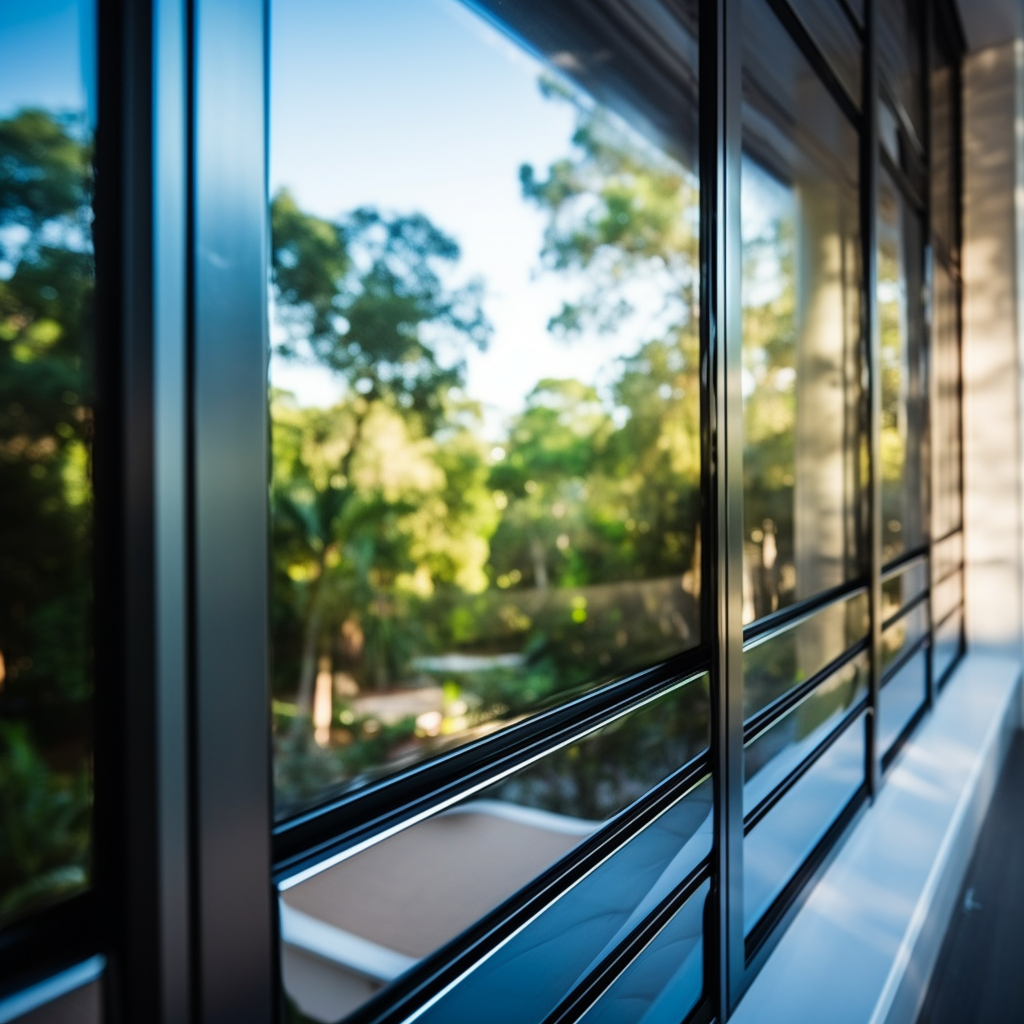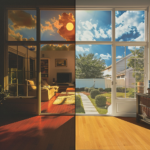
In residential architecture, window tinting surpasses mere visual enhancements to offer a spectrum of tangible benefits. From shielding interiors against UV damage to optimizing energy consumption, the practical applications of window tinting are manifold. Beyond the surface allure lies improved efficiency, heightened security, and enhanced well-being. As we unravel the layers of functionality and effectiveness that window tinting brings to residential spaces, a deeper understanding of its significance emerges, prompting a shift in how we perceive this often-overlooked feature.
UV Protection and Furniture Preservation
Residential window tinting, which can block up to 99% of harmful UV rays, is a crucial barrier that safeguards furniture and interior furnishings from fading and damage. This UV protection is instrumental in preserving valuable items within homes and offices. By acting as a shield against UV radiation, window tinting significantly extends the lifespan of furniture, flooring, and artwork by preventing deterioration caused by prolonged exposure to sunlight. Moreover, maintaining vibrant colors and textures becomes achievable with tinted windows, as they defend against the bleaching effects of UV rays. Not only does window tinting contribute to the aesthetic longevity of interior furnishings, but it also plays a vital role in ensuring a safer indoor environment. Window tinting enhances the overall well-being of individuals inhabiting these spaces by reducing the risk of skin cancer and other health issues associated with UV exposure. In essence, the incorporation of window tinting transcends mere protection, becoming an essential element in furniture preservation and health security.
Energy Efficiency and Cost Savings
Enhancing indoor climate control efficiency through window tinting technology yields tangible benefits in energy conservation and financial savings. Residential window tinting is crucial in reducing heat gain during summer and heat loss in winter, effectively maintaining a comfortable indoor temperature. Window tinting leads to lower energy bills and increased energy efficiency by decreasing reliance on heating and cooling systems. The U.S. Department of Energy reports that window tinting can reduce cooling costs by up to 30%, making it a cost-effective energy-saving solution. Additionally, tinted windows contribute to overall energy efficiency at home or in the office, fostering a sustainable environment. The barrier created by window film against solar heat results in decreased energy consumption, ultimately leading to significant cost savings and a reduced carbon footprint. Embracing window tinting technology enhances living and working environments and promotes a more sustainable and economically efficient lifestyle.
Glare Reduction for Enhanced Productivity
Glare reduction achieved through window tinting technology enhances workplace productivity by minimizing visual distractions and optimizing task focus. Window tinting improves visibility by significantly reducing glare from both natural sunlight and artificial lighting sources, creating a more comfortable work environment. This reduction in glare plays a crucial role in enhancing productivity by minimizing eye strain and fatigue, allowing individuals to concentrate better on their tasks. Tinted windows are particularly beneficial for reducing glare on computer screens and reflective surfaces, improving visual comfort and sustained focus. The ability of residential window tinting to create a conducive environment for activities like reading, studying, or working on a computer cannot be understated. Improved visibility and reduced glare through window tinting contribute significantly to fostering a comfortable and productive living or working space, making it an essential feature for those seeking an optimized work environment.
Privacy and Security Enhancement
Privacy and security are significantly bolstered through window tinting, as it effectively obscures views from outside observers and adds a layer of protection against potential intruders. Residential window tinting offers practical benefits in enhancing privacy and security, making it a valuable addition to homes and businesses. Here are three key ways in which window tinting enhances privacy and security:
- Obscuring Views: Window tinting makes it challenging for passersby to see inside homes, ensuring that activities and belongings are not easily observable from the outside.
- Adding Security Layer: Tinted windows create a barrier that makes it difficult for potential intruders to scout out valuables or occupants, acting as a deterrent to burglars.
- Peace of Mind: By reducing visibility into the home, window tinting provides peace of mind to homeowners, knowing that their privacy and security are enhanced.
Incorporating window tinting for privacy and security purposes offers practical benefits and contributes to a more secure and comfortable living environment.
Easy Maintenance and Long-Term Durability
The durability and low maintenance requirements of residential window tinting contribute significantly to its long-term effectiveness and value for homeowners and businesses alike. Window tinting is designed to be easy to maintain, requiring minimal effort for upkeep. A simple cleaning routine using a glass cleaner and a soft cloth is usually sufficient to keep the tint looking fresh and clear. Due to its durable nature, window tinting can withstand the rigors of everyday use without frequent replacements, ensuring long-term benefits for users. It is recommended to conduct regular cleaning and occasional inspections to address any damage promptly, thus maintaining the tint’s effectiveness and appearance over time. Additionally, professional installation of window tinting often comes with warranty coverage, offering homeowners peace of mind regarding the long-term performance of their investment. Adhering to the manufacturer’s maintenance guidelines can further extend the lifespan of decorative residential window tinting, ensuring continued benefits for an extended period.
Comfort and Temperature Regulation
Residential window tinting is pivotal in enhancing indoor comfort and regulating temperatures by effectively managing solar heat gain and heat loss throughout the year. Through the utilization of advanced window films, homeowners can experience a range of benefits related to energy efficiency and comfort:
- Energy Savings: Window tinting reduces the reliance on heating and cooling systems by minimizing heat transfer, resulting in lower energy consumption and decreased utility bills.
- Temperature Regulation: By blocking solar heat gain in the summer and reducing heat loss in the winter, window tinting helps maintain a stable and comfortable indoor temperature year-round.
- Utility Bill Reduction: According to the U.S. Department of Energy, window tinting can lead to cooling cost savings of up to 30%, making it a cost-effective solution for enhancing comfort while lowering utility expenses.
Aesthetics and Exterior Appeal
A property’s visual aesthetics and exterior appeal can be enhanced by applying decorative residential window tinting. Decorative residential window tinting offers a stylish and modern touch to the windows, elevating the overall aesthetic appeal of a home. By providing various design options, such as frosted, stained glass, or patterned films, homeowners can choose tints that complement the architecture and style of their house. This customization allows for a cohesive look that enhances the property’s curb appeal. The selection of different tint shades and patterns further enables a personalized touch, matching the house’s color scheme or design theme. Beyond looks, the aesthetic benefits of residential window tinting add beauty and offer a practical and innovative solution for homeowners looking to enhance the exterior appeal of their residences.
Health Benefits and UV-Related Issues
Building upon the practical benefits of residential window tinting, the health advantages and UV-related issues associated with this home improvement solution are crucial to consider for maintaining a safe and protected indoor environment.
Health Benefits and UV-Related Issues:
- UV Protection: Residential window tinting blocks up to 99% of harmful UV rays, reducing the risk of skin cancer and premature aging.
- Interior Protection: Window tinting helps protect interior furnishings, flooring, and artwork from fading and damage caused by UV radiation.
- Additional Defense Layer: Tinted windows act as an additional defense layer against UV exposure, contributing to a healthier indoor environment.
Conclusion
In conclusion, the practical applications of residential window tinting extend far beyond mere aesthetics, encompassing a range of benefits such as UV protection, energy efficiency, glare reduction, privacy, security, and low maintenance. This versatile solution enhances the comfort and functionality of indoor spaces and contributes to cost savings and overall well-being. With its multifaceted advantages, window tinting proves to be an essential investment for homeowners and businesses seeking to optimize their living and working environments.






Comments are closed.